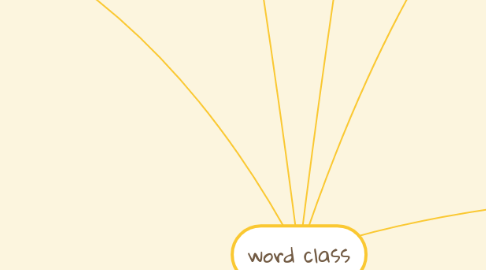
1. adjectives
1.1. Gradable
1.1.1. these adjectives have 3 forms which can be graded upwards with the suffixes ‘er’ and ‘est’ or by adding ‘more’ or ‘most before the adjective
1.1.1.1. absolute
1.1.1.1.1. the base form of an adjective
1.1.1.2. comparative
1.1.1.2.1. the form if an adjective that designates comparison between two things
1.1.1.3. superlative
1.1.1.3.1. expresses the highest level of the quality represented by an adjective
1.2. non-gradable
1.2.1. these are adjective that are not more, less or most. its a solid state
1.2.1.1. pregnant (cant be more or most pregnant)
2. Verbs
2.1. auxiliary
2.1.1. assists the main verb
2.1.1.1. modal auxillary
2.1.1.1.1. expresses degree of possibility, probability, necessity or obligation
2.1.1.2. primary auxillary
2.1.1.2.1. denotes change of tense
2.2. copular
2.2.1. a verb that takes a complement (usually a form of the verb ‘to be’ used with an adjective fir description)
2.2.1.1. our insects ARE important
2.3. primary
2.3.1. be
2.3.1.1. am
2.3.1.2. are
2.3.1.3. is
2.3.1.4. was
2.3.1.5. were
2.3.2. have
2.3.2.1. have
2.3.2.2. had
2.3.3. do
2.3.3.1. do
2.3.3.2. does
2.3.3.3. did
2.4. verb types
2.4.1. irregular
2.4.1.1. change their form when changing from present to past tense
2.4.1.1.1. swim
2.4.1.1.2. swam
2.4.2. regular
2.4.2.1. take a regular ‘ed’ inflection when changing from present to past tense
2.4.2.1.1. walk
2.4.2.1.2. walked
2.4.3. inflection
2.4.3.1. when you add an ending to a verb to change tense or number
2.4.3.1.1. ed
2.4.3.1.2. ing
2.4.4. present particple
2.4.4.1. a verb ending with ‘ing’
2.4.4.1.1. playing
2.4.4.1.2. catching
2.4.5. past participle
2.4.5.1. a verb ending in ‘ed’
2.4.5.1.1. played
2.4.5.1.2. jumped
2.4.6. infinitive
2.4.6.1. a verb with ‘to’ positioned before it
2.4.6.1.1. to play
2.5. verb categories
2.5.1. dynamic
2.5.1.1. processes where there is a change in state over time
2.5.1.1.1. paint
2.5.1.1.2. remove
2.5.1.1.3. eat
2.5.2. intransitive
2.5.2.1. a process that has no object
2.5.2.1.1. yawned
2.5.2.1.2. slept
2.5.3. transitive
2.5.3.1. a process that has an object
2.5.3.1.1. most verbs
2.5.4. non-finite
2.5.4.1. a verb that has not been inflected
2.5.4.1.1. to play
2.5.4.1.2. watching
2.5.5. finite
2.5.5.1. a verb that has been inflected m
2.5.5.1.1. most verbs
2.5.6. material
2.5.6.1. describes actions or events
2.5.6.1.1. hit
2.5.6.1.2. run
2.5.6.1.3. play
2.5.7. mental
2.5.7.1. describes perceptions, thought or speech
2.5.7.1.1. think
2.5.7.1.2. believe
2.5.7.1.3. speak
2.5.8. relational
2.5.8.1. describes states of being or are used to identify
2.5.8.1.1. be
2.5.8.1.2. appear
2.5.8.1.3. seem
2.5.9. stative
2.5.9.1. processes where the situation remains constant
2.5.9.1.1. love
2.5.9.1.2. hold
2.5.9.1.3. believe
3. preposition
3.1. a word which shows how elements in a sentence or clause relate to each in time or space
3.1.1. in
3.1.2. on
3.1.3. under
3.1.4. above
3.1.5. behind
4. Nouns
4.1. Abstract
4.1.1. refers to states, feelings and concepts that have no physical existence
4.1.1.1. pain
4.1.1.2. happiness
4.2. Concrete
4.2.1. refers to objects that have physical existence
4.2.1.1. count
4.2.1.1.1. concrete nouns that have a plural form
4.2.1.2. mass
4.2.1.2.1. concrete nouns that refer to a collection/group
4.3. proper
4.3.1. refers to names of people or places
4.3.1.1. Joe
4.3.1.2. London
4.4. common
4.4.1. refers to any noun which is not proper
4.4.1.1. concrete
4.4.1.2. abstract
4.5. collective
4.5.1. refers to a single group composed of multiple number
4.5.1.1. a class of students
4.5.1.2. a flamboyance of flamingos
5. determines
5.1. article
5.1.1. a determiner that denotes a singular form
5.1.1.1. definite artice
5.1.1.1.1. the
5.1.1.2. indefinite article
5.1.1.2.1. a
5.1.1.2.2. an
5.2. possesive
5.2.1. determiners which shows who the noun belongs to
5.2.1.1. my
5.2.1.2. our
5.2.1.3. your
5.3. quantity
5.3.1. determines the amount of the noun
5.3.1.1. many
5.3.1.2. few
5.3.1.3. several
6. pronouns
6.1. demonstrative
6.1.1. a pronoun that represents a thing or things
6.1.1.1. singular
6.1.1.1.1. this
6.1.1.1.2. that
6.1.1.2. plural
6.1.1.2.1. these
6.1.1.2.2. those
6.2. object
6.2.1. a pronoun that usually appears as being affected by a verb process
6.2.1.1. singular
6.2.1.1.1. me (first person)
6.2.1.1.2. you (second person)
6.2.1.1.3. him/her/them (third person)
6.2.1.2. plural
6.2.1.2.1. us (first person)
6.2.1.2.2. you (second person)
6.2.1.2.3. them (third person)
6.3. possessive
6.3.1. a pronoun that demonstrates ownership
6.3.1.1. singular
6.3.1.1.1. mine (first person)
6.3.1.1.2. yours (second person)
6.3.1.1.3. his/hers/theirs (third person)
6.3.1.2. plural
6.3.1.2.1. ours (first person)
6.3.1.2.2. yours (second person)
6.3.1.2.3. theirs (third person)
6.4. reflexive
6.4.1. a pronoun that is preceded or followed by the noun, adjective, adverb or pronoun to which it refers within the same clause
6.4.1.1. first person
6.4.1.1.1. myself
6.4.1.2. second person
6.4.1.2.1. yourself
6.4.1.3. third person
6.4.1.3.1. himself
6.4.1.3.2. herself
6.4.1.3.3. themselves
6.5. relative
6.5.1. a pronoun used to connect a clause or phrase to a noun or pronoun
6.5.1.1. defining relative clause
6.5.1.1.1. that (subject)
6.5.1.1.2. whom (object)
6.5.1.1.3. whose (possessive)
6.5.1.2. non-defining relative clause
6.5.1.2.1. who (subject)
6.5.1.2.2. whom (object)
6.5.1.2.3. whose (possessive)
6.6. subject
6.6.1. a pronoun that usually occurs as the actor in a verbal phrase
6.6.1.1. singular
6.6.1.1.1. i (first person)
6.6.1.1.2. you (second person)
6.6.1.1.3. he/she/they (third person)
6.6.1.2. plural
6.6.1.2.1. we (first person)
6.6.1.2.2. you (second person)
6.6.1.2.3. they (third person)
7. adverbs
7.1. manner
7.1.1. describes how something happened
7.1.1.1. she ate the cheese greedily
7.2. time
7.2.1. describes when something happened
7.2.1.1. she brought the cheese yesterday
7.3. place
7.3.1. describes where something happened
7.3.1.1. put the cheese there
7.4. frequency
7.4.1. describes how often something happened
7.4.1.1. she regularly purchases cheese
7.5. degree
7.5.1. describes how much there is of something
7.5.1.1. she really likes cheese
8. conjunctions
8.1. coordinating conjunctions
8.1.1. these signal the start of a coordinating clause
8.1.1.1. he laughed like a drain AND fell over backwards
8.2. subordinating conjunctions
8.2.1. these signal the start if a subordinating clause
8.2.1.1. BECAUSE i love you, i’ll buy you flowers
